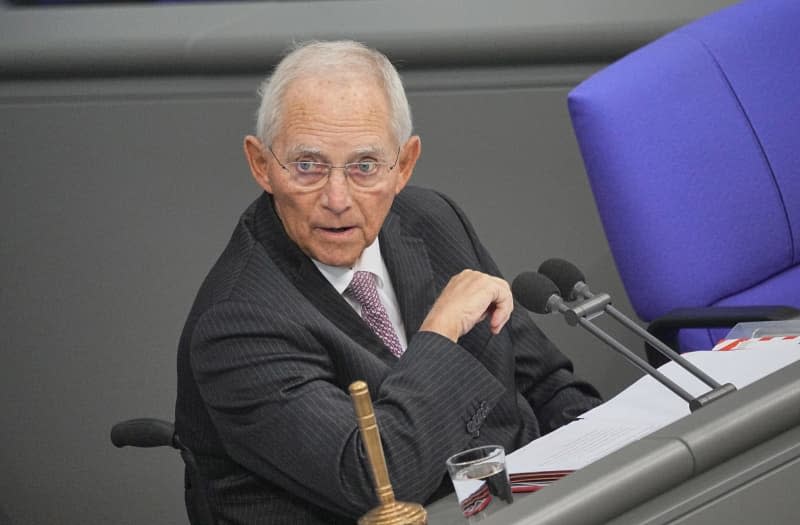German politician Schäuble's memoir details 2015 bid to oust Merkel

- Oops!Something went wrong.Please try again later.
- Oops!Something went wrong.Please try again later.
- Oops!Something went wrong.Please try again later.
- Oops!Something went wrong.Please try again later.
In his posthumous memoir, longtime German conservative politician and former finance minister Wolfgang Schäuble details an attempt by fellow Christian Democrats (CDU) to overthrow then-chancellor Angela Merkel during the 2015 refugee crisis.
The memoir alleges that a prominent Bavarian politician tried to recruit him as a potential chancellor candidate as part of an effort to replace Merkel. Some Bavarian politicians on Wednesday disputed Schäuble's account.
The incident is recounted in an excerpt from the memoir published on Wednesday in the magazine Stern. The book, "Memories: My Life in Politics," is due to be published next week.
Schäuble was the longest-serving member of parliament in German history. He died on December 26 at the age of 81.
Schäuble recounts that tensions ran high within the conservative bloc during 2015, and that leaders of the CDU's Bavarian sister party, the Christian Social Union (CSU), made an attempt to replace Merkel as chancellor - and tried to recruit Schäuble as her replacement.
As Schäuble recalls, Bavaria's state premier at the time, Horst Seehofer, denounced Merkel at the CSU's party conference in 2015 and "read the riot act to the chancellor like a schoolgirl" - while Seehofer's predecessor, Edmund Stoiber, agitated against Merkel as well.
"[Stoiber] wanted to persuade me to topple Merkel in order to become chancellor myself," Schäuble writes.
But Schäuble writes that he firmly rejected the suggestion.
"As with [former CDU chancellor Helmut] Kohl decades earlier, I stuck to my conviction that toppling my own chancellor could only harm our party in the long term without really solving the problem," according to the excerpt. "That was my understanding of loyalty, which may seem a little antiquated by today's standards."
Seehofer told the Augsburger Allgemeine newspaper that Stoiber never spoke to him about an alleged attempt to topple Merkel, perhaps "because it was absolutely clear that he could never have won [Seehofer] over to such a path."
However, Seehofer said it was generally known that Stoiber was a massive critic of Merkel's handling of the refugee issue.
Stoiber told dpa that he did not wish to comment on Schäuble's account, saying he wished to keep confidential the many private conversations with Schäuble and other colleagues.
Stoiber was Bavarian state premier from 1993 to 2007 and chairman of the CSU from 1999 to 2007. During the refugee crisis, he repeatedly criticized Merkel's policies, which included opening Germany's borders to over 1 million asylum seekers.
"I have never commented on reports about this, and of course this still applies to me today after his death," Stoiber told dpa.
In the passages published by Stern, Schäuble reiterated his fundamental support for Merkel's decision to keep Germany's borders open to refugees in the autumn of 2015 but also criticized her actions on the issue.
"When the chancellor made the decision on September 4, 2015, which in retrospect was central to this crisis, to keep the borders open in view of the catastrophic conditions at the train station in Budapest, where thousands of refugees were stranded, I thought this was the right thing to do for humanitarian and European policy reasons."
Schäuble also endorsed Merkel's famous phrase on the issue: "We can do it."
But the late politician argued in the memoir that those sentiments "needed to be accompanied by a number of other measures and efforts to make it clear that this one-off emergency measure was unrepeatable."
He was occasionally frustrated "that Merkel remained resistant to consultation in some respects."
"In my opinion, she would have had many different opportunities to really lead politically and not just react."

